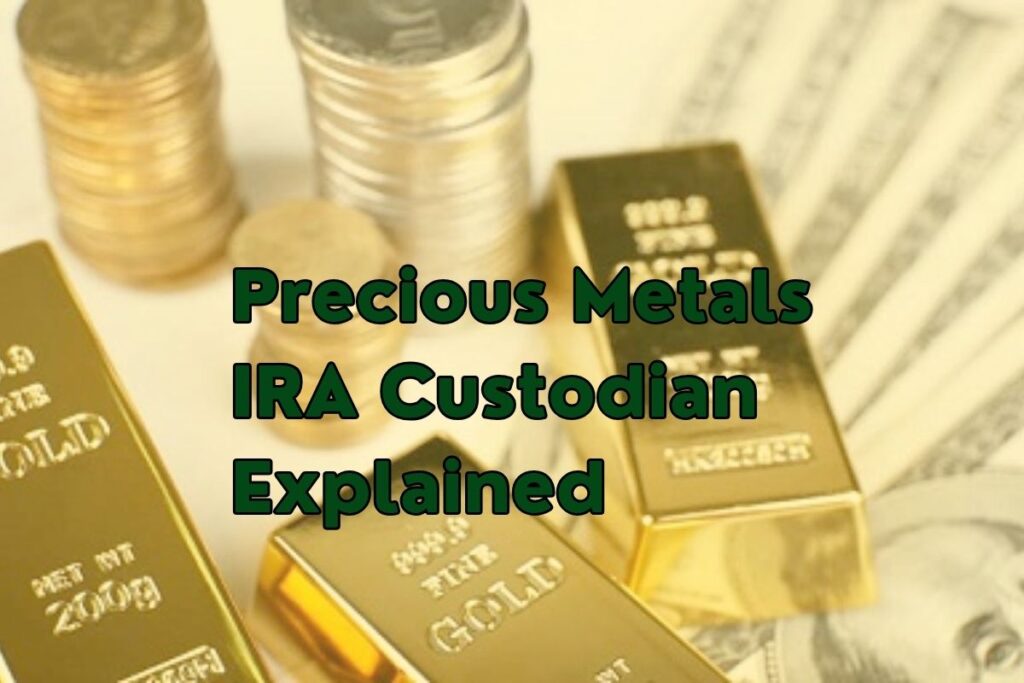As with the rise in the inflation, certain tension that’s occurring in the geopolitical sector and stock market has become extremely volatile. All this have in one or the other way created impact on the traditional retirement portfolios. Nowadays, more Americans are diversifying their investment into precious metal IRAs. These accounts offer a unique way in holding physical assets like gold, silver, and platinum or palladium under a tax-advantaged retirement portfolio.
There are certain rules that are created by the associations which clearly state that you cannot buy or store these metals on your own. The IRS will require a qualified IRA custodian to handle the account legally and ensure all the compliance. In this guide, we will cover everything that you need to know about choosing a precious metal IRA custodian which is based on IRS, SEC, and FINRA rules.
What Is a Precious Metals IRA Custodian
A custodian is an IRS-approved financial institution, such as a bank, a trusted company, or any specialized non-bank entity that manages and reports on self-directed IREs, SDIRAs. All these include holding physical precious metals. These custodians are responsible for opening and maintaining your IRA, executing any kind of purchase or sale of IRS-approved metals. They coordinate with approved depositories for secure storage. They handle IRS filing, Form 5498, Form 1099-R, etc. They ensure that all rules under IRC section 408 are being followed
You are not legally entitled to act as your own custodian or to store these precious metals at home for an IRS. And if you do so, then you will violate IRS rules and this will trigger distribution taxes and penalties onto you.
Why You Need an IRS-Approved Custodian
The IRS has given a mandatory rule that all IRA assets, whether they are stock, real estate, or metal, should be properly held by a qualified custodian to preserve the account’s tax-advantaged status.
Custodians tend to work in tandem with different authorities for your precious metal IRAs. These are dealers who sell IRAs approved metals and depositories who store the metals in secure or insured facilities. The custodian is basically a neutral third party that ensures that everything is compliant, reportable, and legally protected. According to IRS rule, all the assets must not be in constructive receipt of the IRA holder. Any kind of home storage or personal possession will violate this rule.

Rules for Precious Metals in IRAs
Custodians have an important duty that they ensure that all the precious metals that were being purchased meet the IRS Fineness and Eligibility Standards.
| Metal | Minimum Fineness | Examples of Approved Products |
| Gold | 0.995 | American Gold Eagle, Canadian Maple Leaf, gold bars |
| Silver | 0.999 | American Silver Eagle, Austrian Philharmonic |
| Platinum | 0.9995 | American Platinum Eagle, platinum bars |
| Palladium | 0.9995 | Approved palladium bars |
Any kind of numismatic and collectible coins are not allowed. Only the bullions and IRS approved coins will be qualified for IRA.
How Custodians Work with Depositories
Since you are not eligible for storing the metals at your home, the role of custodian here is that they will arrange storage for these assets with IRS IRS-approved depository, such depositories are :
- Delaware Depository
- Brink’s Global Services
- International Depository Services (IDS) of Texas
All of These facilities are:
- Insured
- Audited regularly
- Compliant with IRS standards
You have the choice and you may choose between
- Commingled storage which is pooled with others’ assets
- Segregated storage, this is stored separately in your name, higher cost is applicable to these .
Common Fees that is Charged by Custodians
While traditional IRAs have very nominal fees but self directed IRAs especially those who are involving any kind of physical metals tends to have higher costs compared to others.
Typical fee structure of custodians is :
| Fee Type | Range |
| Account Setup | $50 – $300 (one-time) |
| Annual Custodian Fee | $75 – $300 |
| Storage Fee | $100 – $300/year |
| Wire/Transaction Fee | $25 – $100 |
| Account Termination | $100 – $150 (if closed) |
you must ask for full fees disclosure before you open an account. As fees may vary widely across providers.
Top IRS-Approved Custodians for Precious Metals IRAs
All of these institutions are approved by IRS and have a solid reputation for managing your precious metals IRAs.
- Equity Trust Company
- One of the largest self-directed IRA custodians
- Works with multiple metals dealers
- Transparent platform with education tools
- GoldStar Trust Company
- Based in Texas, specializes in metals IRAs
- Easy-to-understand fee structure
- Partners with all major depositories
- Strata Trust Company
- Offers both traditional and self-directed IRAs
- Handles real estate, metals, and other alternative assets
- Competitive fees
- Advanta IRA
- Known for high-touch customer service
- Educational webinars and investor support
- Handles wide range of assets
- Kingdom Trust
- IRS-approved non-bank custodian
- Early adopter of digital and alternative asset IRA services
- Based in Kentucky, operates in all 50 states
The IRS doesn’t come forward in recommending or ranking custodians but the definitely maintain a Nonbank Trustee and Custodian List.
Legal & Tax Implications
Rules for early withdrawals :
- Any kind Distributions that are done before age 59½ are subject to a 10% penalty + income tax
- Your Required Minimum Distributions (RMDs) begin at age 73 for traditional IRAs
Roth vs. Traditional
- Traditional Gold IRA: Pre-tax contributions, taxed withdrawals
- Roth Gold IRA: After-tax contributions, tax-free withdrawals
Tax Reporting:
- Custodians issue Form 5498 for contributions
- Form 1099-R for distributions
Any kind of failure in following these rules will trigger penalties and there will be loss of tax benefits.
Making a choice of right IRA custodian is not just a part of legal requirement but a very strategic decision. A good custodian will keep your account compliant, secure and easy to manage and choosing a bad custodian will lead to unnecessary risks, hidden fees or penalties from IRS.
Before opening an account:
- Check their IRS status
- Review all costs
- Ask about dealer and depository partnerships
- Read customer reviews and legal disclosures
if your still in doubt you should consider speaking to a fiduciary financial advisor and not to someone who is trying to sell you metals.
| Wall Street Metals | Click Here |

